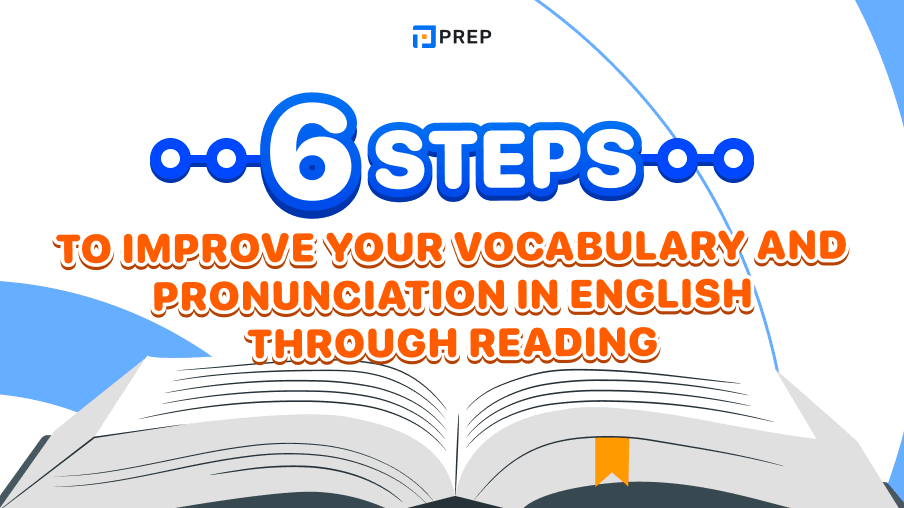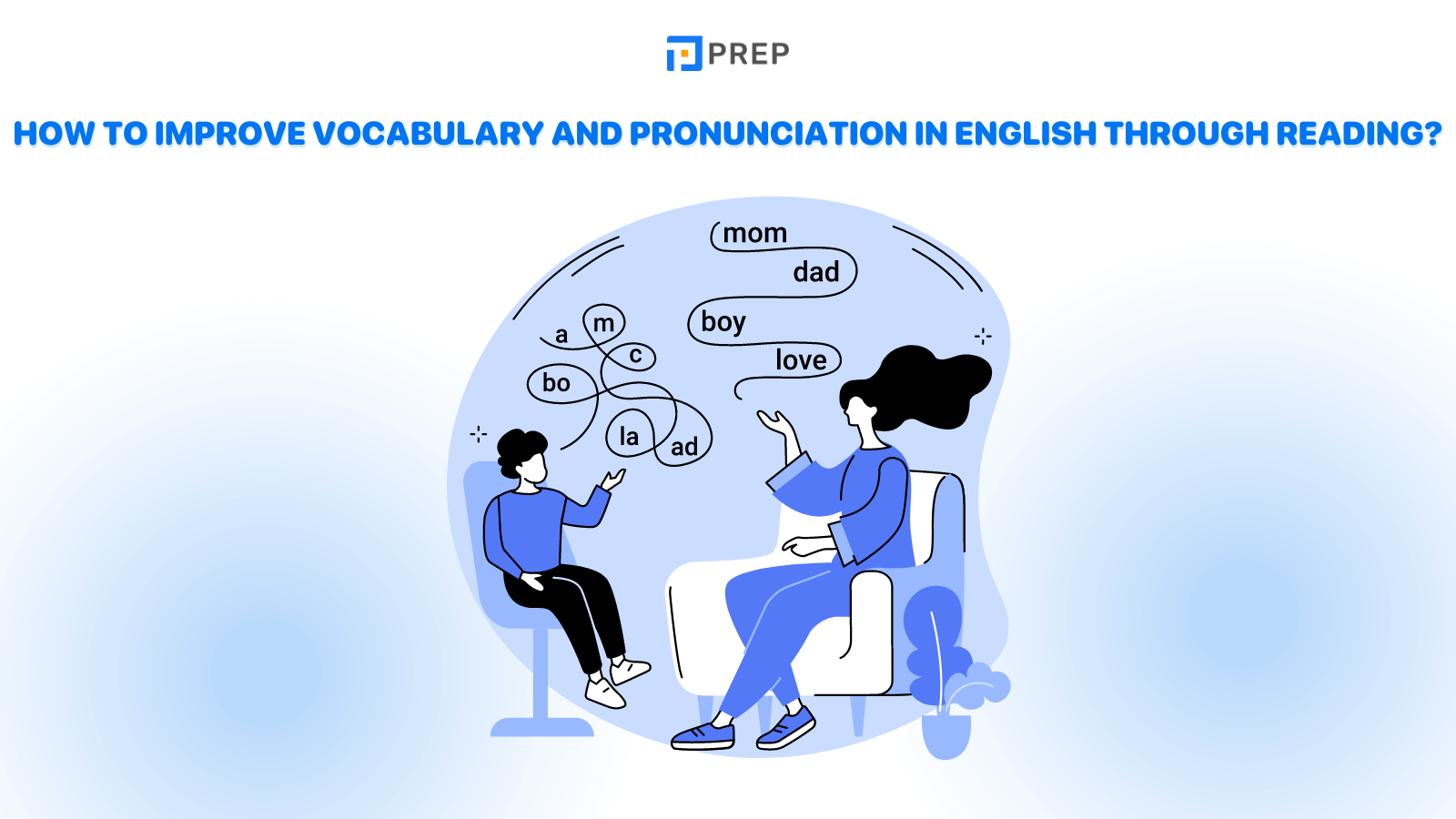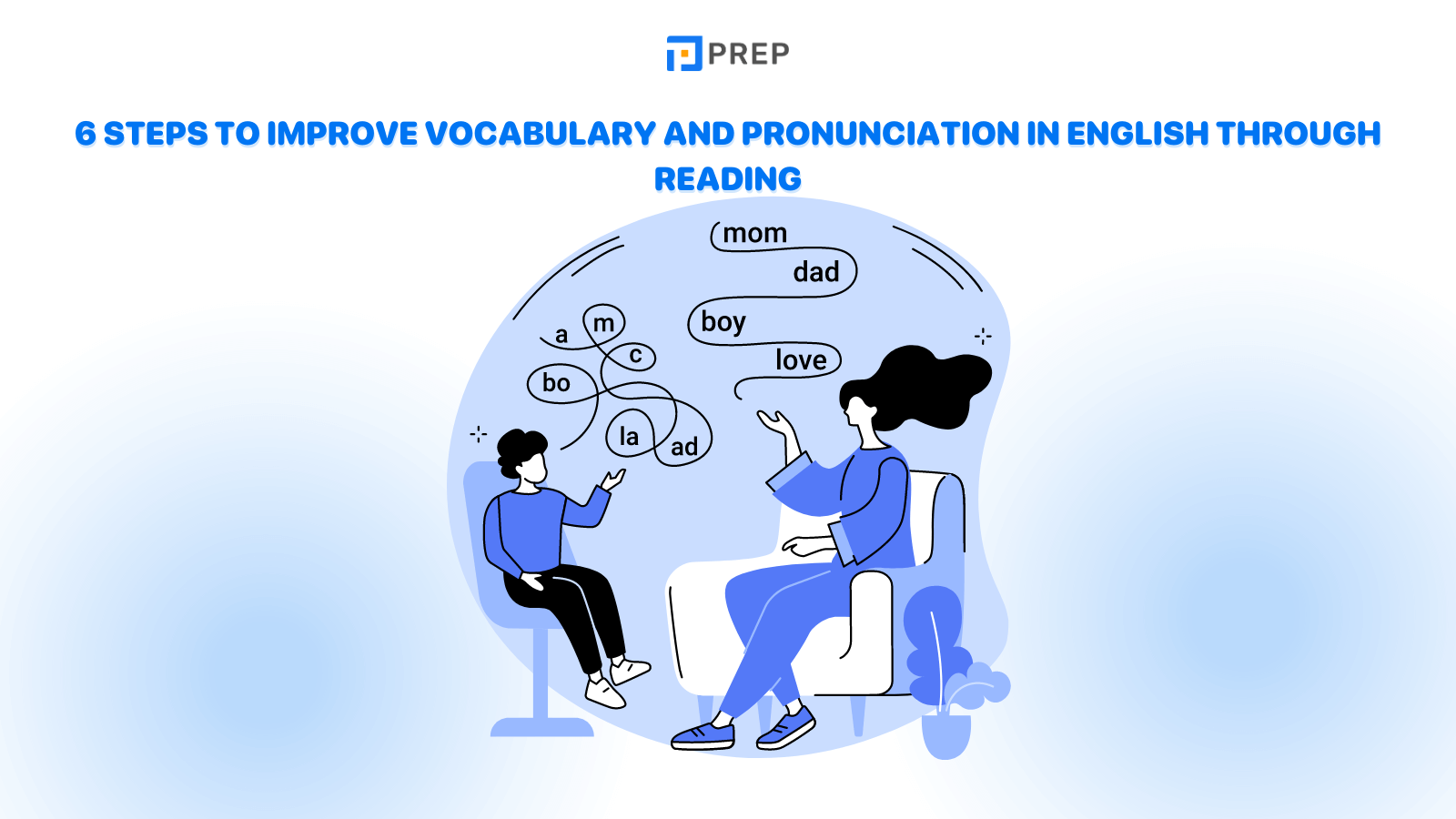6 steps to improve your vocabulary and pronunciation in English through reading
Hello Preppies, in this article, a mentor from PREP will share something that we all care about when studying, which is Can reading books and doing reading exercises help improve our vocabulary and pronunciation in English? If so, how can we achieve the best results? Let's explore 6 steps to improve vocabulary and pronunciation in English through reading with PREP.
- I. Reading books and doing reading exercises are highly effective to improve vocabulary and pronunciation in English through reading
- II. How to improve vocabulary and pronunciation in English through reading?
- III. 6 steps to improve vocabulary and pronunciation in English through reading
- Step 1: Choose suitable reading material based on your proficiency level
- Step 2: Skim through the entire article to understand the general meaning
- Step 3: Read it a second time
- Step 4: If you still don't understand, let's use a dictionary
- Step 5: Note new words in a vocabulary notebook, along with their meanings and original sentences from the text
- Step 6: Practice pronunciation
- IV. Start Your IELTS Journey

I. Reading books and doing reading exercises are highly effective to improve vocabulary and pronunciation in English through reading
First of all, let's make a small comparison with native speakers: according to research, a native 12th-grade student knows about 50,000 words (White, Graves, Slater, 1990). Yes, that's right, a number with five digits! And each year, they learn around 3,000 to 4,000 new words. Moreover, their vocabulary doesn't just include individual words but also various variations, such as verb forms, adjective forms, and so on.
Of course, we don't need that many words to pass the national high school graduation exam or exams like IELTS, TOEFL, etc. However, that enormous number helps us realize the importance of reading. Nevertheless, it's certain that studying long vocabulary lists after reading, as a traditional approach, cannot help us achieve the same vocabulary learning speed as native speakers.

Please refer to the following article:
II. How to improve vocabulary and pronunciation in English through reading?

There are two ways to learn English vocabulary through reading books and doing reading exercises:
Method 1: Leisure reading and entertainment
This method is suitable for those who are too lazy to learn English vocabulary. To learn vocabulary by this approach, we primarily rely on understanding the meaning of words through context. To do this, we need to know the meanings of many words surrounding the new word.
According to research, the initial number of vocabulary words we need to know is around 3,000 core words (Restrepo Ramos, F. D., 2015). As we can see, this method should not be applied to beginners or pre-intermediate level learners.
Method 2: Reading to learn vocabulary
Now, what about the second method? Ah, instead of solely relying on understanding the meaning of words through context, we can apply a more proactive strategy, which is using a dictionary to improve vocabulary. When we use a dictionary, we not only grasp the meaning of the word but also learn how to pronounce it and see examples of usage. It's fantastic, isn't it? And this approach can be applied even if we are just starting to learn English.
III. 6 steps to improve vocabulary and pronunciation in English through reading

Both reading methods and strategies are effective in improving vocabulary and pronunciation in English. How should we go about learning vocabulary in the best way while reading, regardless of our proficiency level? Preppies, let's follow these steps:
Step 1: Choose suitable reading material based on your proficiency level
Method 1: We can search for keywords like "B1 reading," "B2 reading," etc., on Google depending on our proficiency level. This method is advantageous, as the reading material will have the vocabulary that suits us. However, the disadvantage is that the topic of the reading material may not be very interesting to us, and it may lack authenticity.
Method 2: Choose authentic articles from foreign news websites like nytimes.com or nationalgeographic.com. The advantage lies in the authenticity of these articles, as they are not tailored to a particular age group or proficiency level. However, the drawback is that the authors do not consider the readers' proficiency level, so sometimes we may encounter articles that are too challenging for us.
In addition, let’s consider the website https://happynews.com/, which provides a compilation of positive news. We can simply read the summary of 1 or 2 sentences or click on the provided link to the original article.
Cách 3: follow các trang báo hay meme trên facebook thầy thích cách này nhất vì nó tự nhiên, và ngôn ngữ cũng đủ dễ hiểu cho mình. Thậm chí ta có thể học từ mới qua comment luôn các bạn ạ. Một số trang thầy recommend:
Method 3: Follow news websites or meme pages on Facebook. This approach is favored by many due to its naturalness and the use of language that is relatively easy to comprehend. Additionally, learners have the opportunity to encounter new words and expressions through the comments section. Below are some recommended pages to consider:
- The Language Nerds: Memes about language, with many interesting topics.
- Interesting Engineering: A specialized website on science and technology topics.
- National Geographic Asia: An information website covering various aspects of life.
- Humans of New York: Interviews and stories about people's lives.
These articles may be quite long, but they are deeply moving and help us understand many aspects and hidden corners of each individual's life. Because they have a strong emotional impact, the words we learn from them will stick with us for a long time.
Step 2: Skim through the entire article to understand the general meaning
Read through the entire article quickly to grasp the general meaning in a fun and understanding manner. And if you find it too difficult or don't understand anything, then... skip it and read another article.
Step 3: Read it a second time
For words that you don't fully understand, try using the context strategy to deduce their meaning.
Step 4: If you still don't understand, let's use a dictionary
Depending on your proficiency level, you can utilize either an English-English dictionary such as Cambridge Dictionary or an English-Vietnamese dictionary like Google Translate. It's crucial to note that in steps 3 and 4, your focus should be on selecting important or necessary words for understanding the text, rather than attempting to comprehend every single word. This approach helps to maintain the reading flow without unnecessary interruptions. Determining what qualifies as important or necessary can be evaluated after the initial read-through of the text.
Step 5: Note new words in a vocabulary notebook, along with their meanings and original sentences from the text
To firmly memorize the newly learned words, we can write them down in a notebook along with their meanings and the original sentences from the text. Later on, we can review them regularly during the English learning process. Ideally, when we look at a word, we should immediately be able to recall which text it appeared in and its corresponding meaning.
Step 6: Practice pronunciation
Additionally, we should practice pronouncing these words. We can use phonetic transcriptions as well as the standard pronunciation provided by the Cambridge Dictionary as a model. Learning pronunciation will address two issues: adding a channel (the sound channel), which helps enhance the ability to remember words, and practicing pronunciation for future use in speaking and listening tasks. (We need to know how a word is pronounced so that when we hear it in a listening exercise, we can recognize it.)
IV. Start Your IELTS Journey
This article provided 6 steps to improve vocabulary and pronunciation in English through reading. Hopefully, the knowledge shared by Mentor Hai from PREP will help you quickly enhance your English vocabulary and achieve accurate pronunciation. If you want guaranteed improvement in IELTS, don’t miss these game-changing courses below:
- IELTS online course: Mastering IELTS exam from zero to hero

Hi I'm Chloe, and I am currently serving as an Product Content Administrator at Prep Education. With over five years of experience in independent online IELTS study and exam preparation, I am confident in my ability to support learners in achieving their highest possible scores.
Comment
Premium content
View allPersonalized roadmap
Most read












